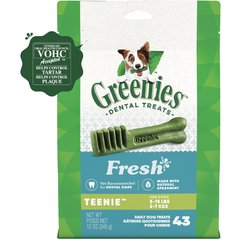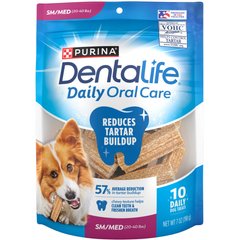Can Dogs Eat Rib Bones?
wip-studiolublin/iStock/Getty Images Plus via Getty Images
You’re polishing off the last of your BBQ and notice Fido anticipating a bite. Once you’ve nibbled away at those tasty ribs, you might be tempted to offer the leftover bones to your pooch. But can dogs have rib bones, too?
Unfortunately for your furry friend, dogs should not eat rib bones—or any animal bones, for that matter.
Rib bones can splinter easily and can pose very serious health issues for dogs who get ahold of them, from broken teeth to intestinal blockages.
If your hound has a penchant for gnawing, however, there are plenty of safe alternatives to animal bones that still let them satisfy their urge, which we’ll get into.
Can Dogs Eat Rib Bones?
All animal bones, including rib bones, are a big “no” for dogs—regardless of a dog’s size and breed, and regardless of whether the bones were cooked.
Why Are Rib Bones Bad for Dogs?
Rib bones can cause serious health issues that require urgent medical attention.
The risks of feeding your dog rib bones include:
Broken or Fractured Teeth
Chewing rib bones can lead to a broken or fractured tooth and can cause injuries to your dog’s gums and mouth.
A broken tooth can be very painful and can cause a tooth root abscess if not properly treated. Sometimes a root canal can be performed or a crown can be applied to save the fractured tooth. Unfortunately, if the damage is severe, the fractured tooth would need to be extracted.
Choking Hazard
Bones are a common choking hazard for dogs, and this can happen if a piece of bone gets stuck in their airway.
Signs your dog is choking can include:
-
Gasping
-
Struggling to breathe or not breathing
-
Making loud breathing sounds
-
Pawing at their face
-
Acting frantic or panicked
-
Turning blue
-
Loss of consciousness
Choking is an emergency. Here are the steps to take if your dog is choking:
-
Attempt to carefully remove the obstructing object from the airway or perform the Heimlich maneuver to dislodge the bone.
-
Seek veterinary care at your local veterinary ER or vet clinic, even if you’re able to remove the bone. They can evaluate your dog’s mouth, throat, and neck for any trauma from the bone, and will likely do X-rays to ensure your dog did not swallow other bones.
Splintering
Cooked bones can be an even bigger threat than uncooked bones.
That’s because cooked bones are more likely to splinter, possibly causing a life-threatening condition called peritonitis.
Intestinal Blockage
Intestinal blockage is another serious risk of sharing bones with your dog. This can happen if your dog is unable to pass the swallowed bone in their stool.
Blockages can cause a rupture of the intestines (known as perforation) or even destroy one section of intestines; both of these situations can be fatal.
If you suspect your dog has an intestinal blockage, seek immediate care with your veterinarian or local vet emergency clinic.
My Dog Swallowed a Rib Bone—What Do I Do?
If your dog swallows a rib bone, seek immediate veterinary care with your vet or local vet emergency clinic.
The veterinarian can offer specific advice tailored to your dog’s health history based on their physical exam. They may recommend:
-
X-rays to evaluate your dog's digestive tract
-
Blood tests, IV fluids, medications for pain and nausea, and an ultrasound
-
Surgery to remove the blockage
If you suspect your dog has swallowed a rib bone, signs of distress or discomfort may include:
-
Lethargy/listlessness
-
Trouble breathing
-
Collapse
-
Anorexia or decreased appetite
-
Abdominal pain
Even if your dog doesn’t swallow a rib bone, nibbling the fatty tissue that’s often left on the ends can also lead to health issues.
Like any other food that’s high in fat, eating this part of the rib can lead to painful conditions like pancreatitis.
What To Give Your Dog Instead of Rib Bones
Our four-legged friends have an instinct to chew. And there are safer options than animal bones that don’t create major health risks and allow them to satisfy their cravings.
When choosing safe chew objects for your pup, opt for products approved by the Veterinary Oral Health Council (VOHC). Here are some of our VHOC-approved favorites:
Recommended Products
It’s important to remember that with any chew toys, pet parents should always monitor their dog to ensure they’re not breaking off large pieces and swallowing them.
Dogs and Rib Bones FAQs
Can dogs have beef rib bones?
No, dogs should not have beef rib bones. Even though these tend to be larger than other kinds of ribs, the risk of serious injury outweighs any potential benefits of letting your dog have one.
Can dogs have pork rib bones?
No, dogs should not have pork rib bones. There are plenty of other dog-safe alternatives you can offer your pooch that don’t carry the same risk as allowing them to chew on pork rib bones.
Can dogs have cooked rib bones?
No, dogs should not have cooked rib bones. Cooking the ribs doesn’t remove any of the serious risks posed to dogs, such as choking hazards, intestinal blockages, or perforations (tears) in the GI tract.
Are rib bones safe for dogs?
No, rib bones are not safe for dogs. They can easily splinter, cause your dog to choke, or create other serious health issues that can require surgery and other veterinary care.
References
- DeFarges A, et al. Disorders of the Stomach and Intestines in Dogs, Merck Veterinary Manual.
- Barash A, et al. Outcomes of esophageal and gastric bone foreign bodies in dogs, Journal of Veterinary Internal Medicine. 2022
- Arhant C, Winkelmann R, Troxler J. Chewing behaviour in dogs – A survey-based exploratory study, Applied Animal Behaviour Science. 2021



